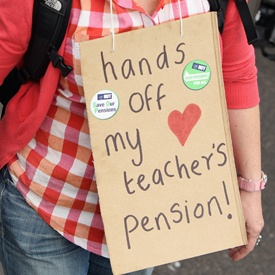Public sector pensions protests across London
As protests take place across London, six unions challenge the government for “unfair” changes to the way pensions are calculated at the high court. Channel 4 News hears why.

A group of angry public sector workers gathered outside the Royal Courts of Justice in London today as unions started their legal battle against the government’s change to pensions.
From April this year, the government has been using the consumer price index (CPI) instead of the traditionally higher retail price index (RPI), to calculate the annual increase in public sector pensions. Chancellor George Osborne announced the move to CPI in the June 2010 budget.
The unions argue that the move was not permitted under social security legislation and that it reneged on assurances given by successive governments that RPI would apply.
In court today, Michael Beloff QC said the legal challenge questioned whether current legislation allowed the switch.
A Treasury spokesman said that public service pensions would continue to provide protection against inflation, and would remain the “very best available”.
I think people are getting angry and I think that government cuts are stinging left right and centre. It’s bound to happen that there are lots of events taking place at the same time. Unite spokesperson
“CPI is already used by the Bank of England to set its inflation target and, unlike RPI, is designed to take account of the fact that consumers tend to shop around, switching to cheaper alternatives when prices for similar goods change,” he added.
The unions involved in the action are Unite, Unison, the Fire Brigades’ Union (FBU), the teachers’ union NASUWT, the Public and Commercial Services Union and the prison workers union, the POA.
Read more: Why Cameron’s right on public sector pensions
A ‘vicious attack’ on pensioners
On average, CPI is around 1.2 per cent lower than RPI. Unions maintain that public sector pensioners will be around 15 per cent worse off and that the change is already affecting staff who pay into career average schemes.
FBU General Secretary Matt Wrack said: “The government actions are unfair and, we believe, unlawful. This is a vicious attack on existing and future pensioners that could cost them tens of thousands of pounds. Pensioners are being forced to bear an unfair burden for the financial crisis caused by the banks.”
Frank Keogh, a 49-year-old NHS employee is supporting the legal challenge. “It’s important that we all win this one. When you join a scheme, you agree to abide by the rules. When someone can just change the rules of the agreement, that’s not
What has frustrated public sector workers about this change is that it was imposed as part of the 2010 budget without negotiation with the public sector, he said – on top of a series of other changes made by previous governments.
“This has already happened without any consultation. A judicial review isn’t cheap, but people are willing.
“I have a young daughter at university, and I’m trying to support her. It’s not a great situation for public sector workers, who didn’t cause this situation.”
Protests across London
The unions’ legal case begins as another three separate protests are staged across London. Representatives from the railway industry, agriculture industry – some dressed as scarecrows – and youth groups are demonstrating against governmental policy changes that are affecting their pay and conditions, as well as cuts.
The number of protesters at each of the demos has not yet been confirmed, but Unite says there has been an increase in recent months.
A spokesperson told Channel 4 News: “You just have to look at the march for jobs a few months ago. The more the cuts will bite, the more that people will out and protest.”
The number of protests is a sign of the times, he added.
“I think people are getting angry and I think that government cuts are stinging left right and centre. It’s bound to happen that there are lots of events taking place at the same time – it’s because there are so many cuts and attacks on public services,” he said.